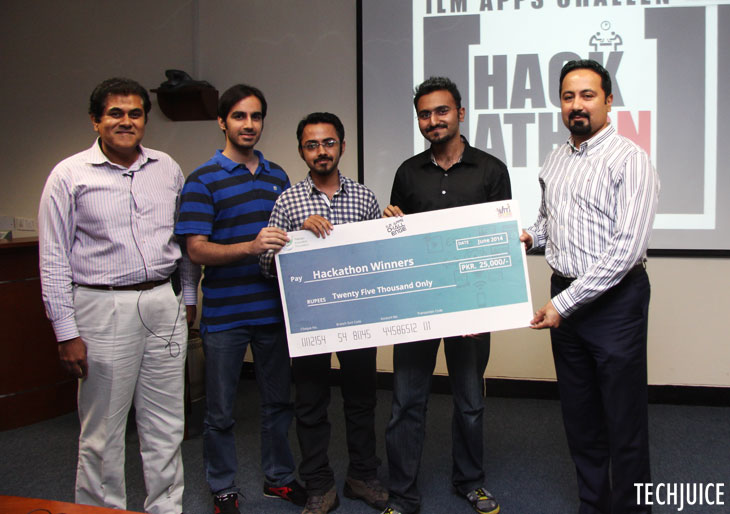Education is a necessity, a birth right, and is the only key to successfully developing nations, generations and countries.
Since many years, there has been an education emergency in Pakistan, nearly 25 million children are deprived of school education. Our education budget has been lower, for many years, than many of other developing Asian countries.
It has been a while that many IT corporations are holding Hackathons to motivate and inspire young entrepreneurs to develop ideas that could benefit civilians and the country. However, it has not been before the ILM apps challenge, that hackathons were primarily arranged to target Pakistan’s educational crisis.
Ilm Apps Challenge’s Hackathon was held across three major cities of Pakistan; Lahore, Karachi and Islamabad. On this distinct type of hackathon, a total of 16 teams were short-listed for the product development bootcamp. They still have 4 wildcard entries to be announced in the next week or so. The final twenty teams will go through the bootcamp in July-August and 10 lucky ideas will get pilot funding from Ilm Ideas and PIF.
Lahore’s Winners
A total of six teams have been elected from Lahore.
1. Team Edutainment seeks to create exciting, visually appealing, inflatable edutainment caravans. With appropriately designed exteriors and interiors, learning tools and props, and cheap and accessible technology, they seek to engage students in learning and motivate them to go back to school.
2. Team Studies Solution aims to reduce dropout rate in rural schools particularly grade 5 by addressing, in particular, poor understanding of basic maths concepts. Studies Solution will address this through fun-based interactive, content specific exercises to enable students to practice their Maths skills.
3. Team GeniTeam proposes to make learning fun through gamification of maths and science curriculum. They want to create a virtual boardgame that engages students through addictive game elements in a self-paced, engaging, and fun learning experience.
4. Lozina Shoaib seeks to create a literacy app for stone deaf children. A PhD student at NUST doing her dissertation on this area, she seeks to operationalise her research into a learning tool that will rid the stone deaf from dependence on sign language. She aims to use mobile devices to get young kids to learn visual phonetics giving them a vocabulary so that they can communicate with the rest of us without an interpretter.
5. Team AK seeks to create culturally relevant content for mobile platforms that is engaging, interactive, and animated and replicates the success of its title ‘Daddoo aur Dhobi’ for the national curriculum.
6. Team Arbisoft seeks to enhance the conceptual understanding of science by creating a virtual platform that enables to students to simulate physics and chemistry practicals. This will be supplemental education for those who already have access to science labs and necessary low-cost curricular support for those who do not have access to labs at school.
Karachi’s Winners
A total of five teams were selected from Karachi
1. Team EDeQUAL seeks to deploy its purpose designed learning approach that engages students in accelerated (english) language learning that enables them to gain grade 4 proficiency in 4-6 months followed by maths instruction to enhance the STEM component.
2. Team AKU-IED seeks to develop a teacher training portal that will bring teachers together on a virtual platform and provide them not just a community but also substantive help and support in training and lesson planning. Through its connections with AKU-IED and Notre Dame Institute, AKU IED will bring peer reviewed lesson plans from a leading teacher training institute online and make them available to any school system and teacher nationally.
3. Team ToffeeTV seeks to build upon its award-winning urdu and english language story telling and animations for young toddlers and develop material aligned with national curriculum thus making national curriculum as much fun as nursery rhymes and story telling.
4. Team Amal seeks to develop an application to inculcate a series of very important cognitive and social and emotional learning (CSES) skills within the curriculum. These skills enable a students to engage with the curriculum better and give them confidence, focus, and retention, among other things, and are known to have an impact on learning itself but also on retention and dropout rates.
5. Team Harrapa seeks to develop an online portal for autistic children that will provide both community and content for parents to engage their children into learning and to enable them to lead a life without adult supervision. The team will build upon the work of parents – particularly mothers – within a real life support group and digitise and animate content for dissemination far and wide.
Islamabad’s Winners
A total of five teams were selected from Islamabad
1. Team SWOGI is seeking to merge old fashioned cartoons and comic strips into the digital age and use them to impart education. It is a mixture of two ventures (Gogin Studios founded by Nigar Nazar, subcontinent’s first female cartoonist and the founder of comic character Gogi) and digital artists and animators of SWAMTech.
2. Team Knowledge Platform is seeking to create an online mobile platform where students, teachers, and content creators and watch videos, play educational games, and enhance their skills.
3. Team White Rice Communications is seeking create a virtual world of ancient architectural civilisations that will impart language learning as well as knowledge of ancient civilisations in a fun-filled manner.
4. Team MS ITE is seeking to create a gamified learning environment for 5th grade science curriculum that will engage students in a visual, interactive, and fun learning experience consisting of lessons, activities, quizzes, funfacts, songs, etc. to make learning of science fun.
5. Team 3Restart is seeking to create an online learning environment that is informed with tools and techniques of child psychology, learning theory, and how memory works to create an enhanced learning experience. This shall be supplemented with data and analytics to identify trends in learning behavior and provide timely feedback, course correction, and a personalised learning path for each learner.
Read also:
6 Problems with Hackathons in Pakistan





 P@SHA Releases Salary Survey Report 2014
P@SHA Releases Salary Survey Report 2014